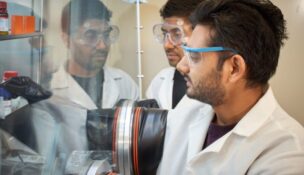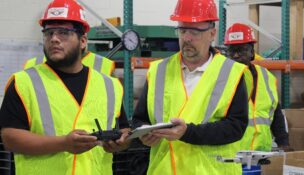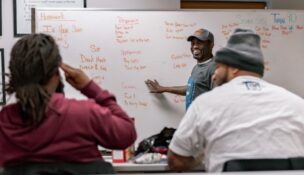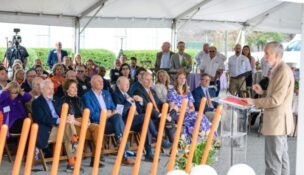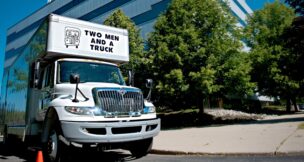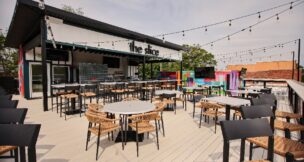ENTREPRENEUR’S JOURNEY: USC, Virginia Tech business students explore CoffeeCandy
Ross Norton //January 24, 2024//
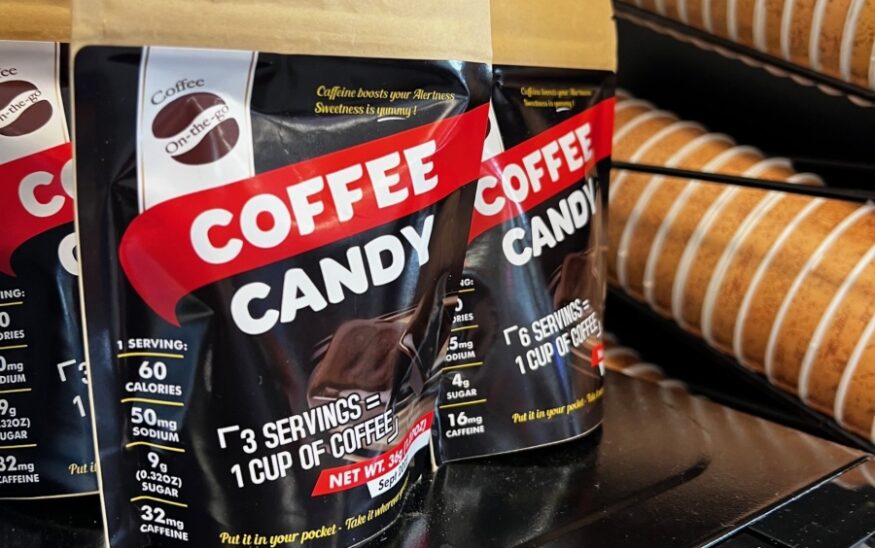
Coffee Candy has found its way to retail shelves in South Carolina. In some, it's displayed with other candy; in some it's placed near the coffee. (Photo/Ross Norton)

Coffee Candy has found its way to retail shelves in South Carolina. In some, it's displayed with other candy; in some it's placed near the coffee. (Photo/Ross Norton)
ENTREPRENEUR’S JOURNEY: USC, Virginia Tech business students explore CoffeeCandy
Ross Norton //January 24, 2024//
A Greenville entrepreneur looking for a way to get more people to eat his coffee has found affirmation in a pair of academic heavyweights.
Don Li’s CoffeeCandy product was taken on by business professors and their classes at the University of South Carolina Darla Moore School of Business and the Virginia Tech Pamplin College of Business.
CoffeeCandy was developed by Li as an edible caffeine alternative for coffee lovers who sometimes may want to forgo the traditional liquid version of java, especially if they want to reduce the number of restroom breaks that follow consumption. SC Biz News has followed his entrepreneurial journey from the product’s introduction to its debut on retail shelves.
Li said he turned to the universities because he has always believed CoffeeCandy could find a fan base on college campuses.
“Many college students need to pull some late-night work, be it preparing for quizzes or exams, or for a class project and more,” he said in an email. “For situations like this, buying a cup of coffee would not be doable, bringing your own coffee would be inconvenient. Besides, a whole cup of coffee could be (too) much caffeine, a potential problem for going to sleep, but popping one CoffeeCandy coffee candy would be just perfect to give them a quick boost.”
He reached out to the University of South Carolina because it’s the state where he lives now and to Virginia Tech because he once lived in Roanoke, Va.
Professors Dirk Buengel at Virginia Tech and Kasie Whitener at USC presented some possible projects to their students and both groups chose CoffeeCandy for separate academic exploration.
Buengel, an associate professor of practice, said Coffee on the Go — the name of Li’s company — was selected as a start-up for Virginia Tech to support with pro bono management consulting services, which is offered as part of the Management Consulting and Analytics major at the Pamplin College of Business.
“In the major’s capstone course, a team of five senior management consulting majors supported Don with a semester-long consulting project to support the next phase of growth for Coffee on the Go,” Buengel said in an email.
The team’s objectives:
Develop a growth and business development strategy,
Develop an operational plan for optimized marketing strategy in support of profitable growth of Coffee on the Go with a focus on enhanced communication approach, including development of attractive website, social media marketing, etc.,
Develop a plan for organizational development of the company in support of next level of growth in terms of resource and investment needs, definition of optimized core processes, etc., and
Develop a three-year financial business plan.
“The main recommendation was a disruptive growth strategy through broader retail channels to scale the business and to drive profitable growth,” Buengel wrote. “These consulting recommendations were presented to Don on Dec. 7 in a one-hour final presentation. A detailed consulting plan with 35 pages was given to Don.”
He said the result of the Virginia Tech work gives the entrepreneur “a lot of food for thought and specific strategic and operative recommendations to launch his stage of profitable growth.”
“The whole program was really a win-win situation,” Buengel said. “The Virginia Tech consulting team benefited greatly from the great project and was able to apply theory consulting expertise to a real-world external client and project. At the same time, Don received pro bono consulting services and a valuable external perspective on his business.”
Closer to home, USC students offered their services through Whitener’s class in the management department. She also is director of programs for the Faber Entrepreneurship Center. The CoffeeCandy project came to her through the center’s director, Jeff Savage, who introduced her to Li.
She said students in her MGMT 479 class were enthusiastic about the project, running two focus groups — one of students and one of faculty — and provided Li with feedback on the flavor, texture and packaging of the product.
“The topic was very popular and the students very curious,” she said in an email. “It was one of the bigger project teams. They set out to determine a few entrepreneurial milestones: 1) Customer validation — did the target market like the product? What feedback could they offer? 2) Was the pricing accurate enough to make a profit on the product? 3) Did the business have sufficient digital assets to support wide distribution and mass sales? 4) What kind of branding could differentiate CoffeeCandy in South Carolina retail stores? 5) What would be the process for getting the product into those retail stores (i.e. Buc-ee’s)?”
The students in Columbia also evaluated the CoffeeCandy website and compared it to competitors to make suggestions on digital assets. They offered some redesigns of branding and focused on making the product a “South Carolina exclusive” product to leverage the strength of the state’s tourism industry.
They provided instructions for how to get into several retail stores that cater to tourists and also some input on the cost of goods and suggested retail price, Whitener said.
“As consultants, their work is provided for Don to make use of (or not) and the students were very engaged with the project,” Whitener said. “It was a good study in how entrepreneurship might not have a standard process (a step-by-step journey, if you will) but that building a business does require nailing down some specific key factors (like cost, differentiation and customer validation) early on.”
Li said he was impressed with the work from both groups of students.
“It was really great to have two students team working on CoffeeCandy for us,” he said. “Their research work is quite impressive. For instance, in one survey, the USC students did a taste event of CoffeeCandy and then followed with a survey. About 41% of the survey takers say they would buy CoffeeCandy if it’s available at the campus.”
Li said he is working to raise more capital to pursue some of the strategies recommended by the two groups of students.
e





